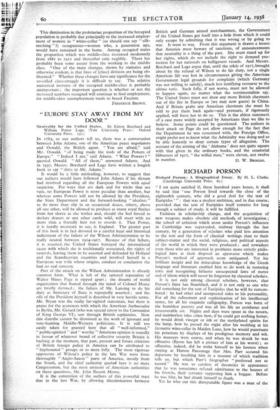" EUROPE STAY AWAY FROM MY
DOOR" IN 1783, so our authors tell us, there was a conversation between John Adams, one of the American peace negotiators and Oswald, the British - agent. " You are afraid," said Mr. Oswald, " of being made the tools of the Powers of Europe." " Indeed I am," said Adams. " What Powers ? " queried Oswald. " All of them," answered Adams. And in 1937, Messrs. Borchard and Lage have written a longish book to say " ditto to Mr. Adams."
It would be a little misleading, however, to suggest that our authors would have followed John Adams if his dictum had involved regarding all the European Powers with equal suspicion. For ways that are dark and for tricks that are vain, no European Power is more peculiar than another, but whereas some Powers will not be allowed by the President, the State Department and the forward-looking " idealists " to do more than slip in an occasional deuce, others, above all one other, will be allowed to produce as many royal flushes from her sleeve as she wishes and, should she feel forced to declare deuces or any other cards wild, will meet with no more than a friendly hint not to overdo it. That Power, it is hardly necessary to say, is England. The greater part of this book is in fact devoted to a careful legal and historical indictment of the failure of the Wilson Administration to be really neutral between 1914-1917. Because of that failure, it is asserted, the United States betrayed the international cause with which she is traditionally associated, the rights of neutrals, leaving them to be asserted and defended by Holland and the Scandinavian countries and involved herself in a European war with whose origins, conduct or conclusion she had no real concern.
Part of the attack on the Wilson Administration is already common form. What is left of the tattered reputation of Walter Hines Page is ripped apart ; the dreams of world organisation that floated through the mind of Colonel House are briefly damned ; the failure of Mr. Lansing to do his duty as Secretary of State is repeatedly asserted ; and the r6le of the President himself is described in very hostile terms. Mr. Bryan was the really far-sighted statesman, but there is praise for the acuteness with which the American Ambassador to Berlin, Mr. Gerard (who was special envoy to the Coronation of King George VI), saw through British sophistries. Now this diatribe cannot be dismissed as the work of ignorant and vote-hunting Middle-Western politicians. It is still too easily taken for granted here that all " well-informed," " public-spirited " and " worthy " American opinion is soundly in favour of whatever brand of collective security Britain is backing at the moment, that past, present and future criticism of British foreign policy in America can be attributed to " hyphenated " groups or to mere folly. The most vigorous opponents of Wilson's policy in the late War were from thoroughly " Anglo-Saxon " parts of America, mostly from the South, and the chief authority quoted here is no mere Congressman, but the most eminent of American authorities on these questions, Mr. John Bassett Moore.
It is the contention of the authors of this powerful tract that in the late War, by allowing discrimination between
British and German armed merchantmen, the Government of the United States got itself into a hole from which it could only escape by admitting that it was wrong or by going to war. It went to war. From this argument is drawn a lesson that America must beware of sanctions, of announcements that neutrality is a thing of the past. She must stand up for her rights, which do not include the right to demand pro- tection for her nationals on belligerent vessels. And Messrs. Borchard and Lage argue that, until the crisis of 1917, brought. about by the refusal of Wilson to do his duty, not a single American life was lost in circumstances giving the American Government legal grounds for complaint (which Germany was not willing to satisfy), much less justifying recourse to the ultimo ratio. Such folly, if not worse, must not be allowed to happen again, no matter what the sentimentalists say. The United States must not draw any more British chestnuts out of the fire in Europe or (we may now guess) in China. And if Britain grabs any American chestnuts she must be told to put them back again—and pressure, if rigorously applied, will force her to do so. This is the ablest statement of a case more widely accepted by Americans than we like to believe. Some points could be questioned. The authors in their attack on Page do not allow enough for the fact that the Department he was concerned with, the Foreign Office, might prefer not to know what the Admiralty was doing and so be able honestly to deny certain types of allegation. The account of the arming of the ' Alabama ' does not quite square with that given in the ordinary books, and the senatorial filibusters of 1917, " the wilful men," were eleven, not twelve






































 Previous page
Previous page